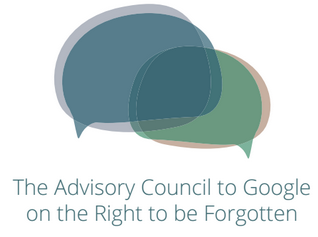Google Advisory Councils rapporteert over Right to be Forgotten
 Professor Peggy Valcke, KU Leuven, nam zitting in de Advisory Council. Lees het rapport hier. Aan te bevelen is ook de lijst van alternatieve ideeën en technische voorstellen. Standaardisatie tussen verschillende zoekmachines, uitgevers verweermogelijkheid geven, classificeren van onrechtmatige content, review sequentie, arbitrage vergelijkbaar met domeinnaambeslechting, aanpassing aan de robot.txt-standaard.
Professor Peggy Valcke, KU Leuven, nam zitting in de Advisory Council. Lees het rapport hier. Aan te bevelen is ook de lijst van alternatieve ideeën en technische voorstellen. Standaardisatie tussen verschillende zoekmachines, uitgevers verweermogelijkheid geven, classificeren van onrechtmatige content, review sequentie, arbitrage vergelijkbaar met domeinnaambeslechting, aanpassing aan de robot.txt-standaard.
• Different search engines should collaborate to standardize the removal process and provide a single, efficient, and effective interface for data subjects requesting removals.41 Taking this idea one step further, we think it would be worthwhile for search engines to consider jointly funding an arbitration board.
• Provide publishers notice and opportunity to challenge delisting decisions through a model on the procedural fairness rules from criminal or civil procedure.42
• Define classes of manifestly unlawful content that presumptively are delisted upon request, and classes that are presumptively not delisted without DPA review.
• If publishers receive notice, give them a shorter window to object to delistings that are manifestly unlawful or for trivial content than for those delisting where a case is made for public interest.43
• Sequence reviews—for example, requiring review by the publisher first, search engine second, DPA third, and a court as a final adjudicative mechanism—and ensure that grounds for decision are articulated at each stage. The Council heard a number of procedural suggestions to achieve an ideal adjudication mechanism for these delisting requests.44
• Delist automatically for all complaints.45
• Reinstate delisted material by default if the publisher challenges the removal, until a resolution of the challenge is reached.46
• Establish a clear channel of appeal to a public authority for publishers seeking vindication of Article 10 rights, parallel to data subjects’ right of appeal to DPAs for Article 8 rights.47
• Establish a public mediation model, in which an independent arbitration body assesses removal requests.48 Several experts suggested this to be modeled on the process for resolving domain name disputes.49
These suggestions also touched on technical tools that might be developed to assist in managing the process. These included:
• a process for demoting links rather than delisting them from search results against a query altogether.50
• automatic expiry for posted content.51
• automatic revival of delisted content after a given period of time, in a way comparable to an embargo period for classified documents in archives.
• extensions to the robots.txt standard:
• to allow webmasters to suppress pages for specified search query terms.
• to specify how search engines can notify webmasters of removals.52
• a mechanism for posting responses or corrections to inadequate, irrelevant, inaccurate or outdated information.53























